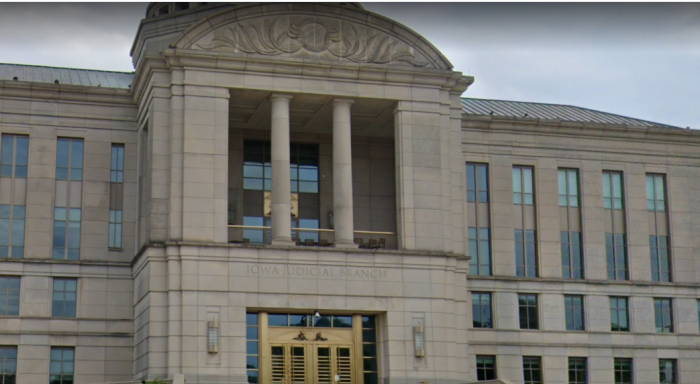Iowa Supreme Court: No right to abortion in state constitution

The Iowa Supreme Court has ruled that there is no right to an abortion in the state constitution, which reversed an earlier ruling by the state’s highest court a few years earlier.
In the case of Planned Parenthood of the Heartland et al. v. Kim Reynolds et al., the state supreme court issued a ruling Friday, reversing a lower court decision against the state’s 24-hour waiting period for an abortion and remanding for further proceedings.
Justice Edward Mansfield delivered the majority opinion, concluding that the court rejects “the proposition that there is a fundamental right to an abortion in Iowa’s Constitution subjecting abortion regulation to strict scrutiny.”
“[T]he Iowa Constitution is not the source of a fundamental right to an abortion necessitating a strict scrutiny standard of review for regulations affecting that right,” wrote Mansfield.
“Constitutions—and courts—should not be picking sides in divisive social and political debates unless some universal principle of justice stands on only one side of that debate. Abortion isn’t one of those issues.”
Mansfield also took issue with the 2018 Iowa Supreme Court decision that had declared abortion a state constitutional right, writing that the earlier decision “lacks textual and historical support.”
“It is doctrinally inconsistent with prior Iowa jurisprudence concerning family rights that followed a balancing approach. Its rhetoric is one-sided. Its constitutional footing is unsound,” he continued.
“While it is true that some other states have provided heightened protection for abortion rights, they have done so by invoking more relevant substantive constitutional guarantees—such as the right of privacy—not a procedural clause like due process.”
Justice Brent Appel filed a dissenting opinion, arguing that by overturning the 2018 decision, the state Supreme Court created “a jurisprudence of doubt about a liberty interest of the highest possible importance to every Iowa woman of reproductive age.”
“We found [in 2018] that fundamental liberty interest in familial relationship holds a place for reproductive choices,” continued Appel.
“We thereby declared that, ‘Autonomy and dominion over one’s body go to the very heart of what it means to be free. At stake in this case is the right to shape, for oneself, without unwarranted governmental intrusion, one’s own identity, destiny, and place in the world.’”
American Civil Liberties Union of Iowa Legal Director Rita Bettis Austen denounced the decision, labeling it a “devastating and shocking reversal.”
“With the constitutional right to abortion under Roe threatened, Iowans are relying on the protection of our state constitution,” stated Austen.
“The right to abortion for Iowa women is essential to their freedom, equality, health, and safety, and it’s something that Iowans overwhelmingly support—now, more than ever.”
The Urbandale, Iowa-based social conservative group The FAMiLY Leader celebrated the state Supreme Court's decision, seeing it as a victory against judicial activism and for unborn children.
“In 2018, five unelected judges brazenly admitted to ignoring the original meaning of the Iowa Constitution to invent a so-called ‘right’ to abortion,” said Bob Vander Plaats, president and CEO of The FAMiLY Leader.
“Today’s ruling moves us closer to the day the people of Iowa can protect pre-born children,” he added. “The future of abortion in Iowa remains uncertain. But this back-and-forth in the courts reveals the Protect Life Amendment is needed now more than ever.”
The Protect Life Amendment Vander Plaats referred to was approved by both houses of the Iowa General Assembly last year and declares that the state constitution “does not recognize, grant, or secure a right to abortion or require the public funding of abortion.” In order to take effect, the Iowa General Assembly must pass the Protect Life Amendment in the next session, which begins next year, and voters must approve it in a ballot referendum.
The Iowa Supreme Court’s decision comes as the nation waits for the U.S. Supreme Court to rule on a case involving a Mississippi state law banning most abortions after 15 weeks into a pregnancy.
Known as Dobbs v. Jackson Women’s Health Organization, many believe the U.S. Supreme Court case will reverse the landmark 1973 decision Roe v. Wade, which struck down abortion restrictions before fetal viability. Politico published a leaked draft opinion in the case last month, which indicated that a majority of justices expressed support for striking down Roe and leaving the issue of abortion up to each individual state to decide. The Dobbs decision is expected to be released by the end of the month.
In the absence of Roe, Iowa would be able to enforce its law banning abortions after six weeks gestation. Iowa is one of 21 states that would either ban abortion completely or restrict abortion more severely if Roe is overturned. Sixteen states would continue to allow abortion throughout most or all of pregnancy as the right to abortion has been codified into state law, three states could put the issue of abortion before voters and the remaining 10 states will continue to enforce existing abortion laws and/or restrictions.




























